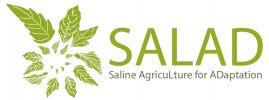General Policy Brief: Impact Investment and Saline Agriculture
Soil and water salinisation are a growing challenge worldwide due to climate change and poor management of agricultural lands. The aim of this policy brief is to shed light on the impact investment opportunities in relation to saline agriculture. Based on an expert workshop conducted at the SALAD-SUSTAIN conference 2024 in Brussels, we present the key messages from the emerging debate. We supplement these findings with the examples of successful implementation of saline agriculture pilots in Kenya, Bangladesh, Pakistan, Egypt and Morocco . Based on these insights, we propose a number of recommendations which are the following:
• Agriculture as a Climate-Smart Practice: Policymakers should formally include saline agriculture under the broader umbrella of climate-smart agriculture to facilitate targeted funding and policy support.
• Bridge the Funding Gap: Inter-national development banks and climate funds should develop hybrid financing models that combine grants and concessionary returns to better support small- and medium-scale saline agriculture projects.
• Promote Pilot Projects: National governments and international institutions should prioritise funding for at least 100 saline agriculture pilot projects (appr. two per country) by 2030 to measure their impact.
• Enhance Government Support: Governments should establish clear regulatory frameworks, including stable land rights and irrigation subsidies to mitigate political and production risks related to the industrialisation of agriculture and water management.
• Encourage International Cooper-ation: Strengthening international cooperation through exchange programs and shared learning platforms will help address technical, financial, and market-related challenges in scaling saline agriculture globally
 saline agriculture
saline agriculture